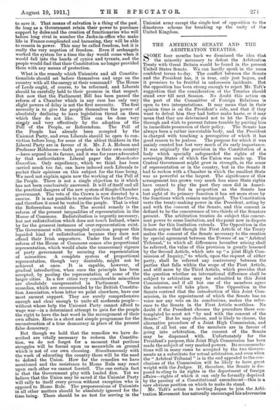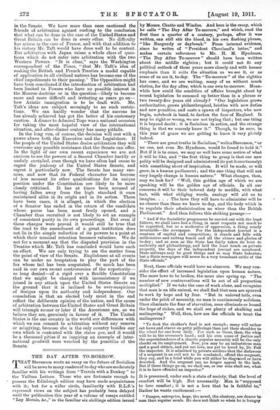THE AMERICAN SENATE AND THE ARBITRATION TREATIES.
SOME four months back we dismissed the idea that the minority necessary to defeat the Arbitration Treaty with Great Britain would be found in the present United States Senate. We can hardly speak in the same confident terms to-day. The conflict between the Senate and the President has, it is true, only just begun, and it promises to be fruitful in unforeseen incidents. But the opposition has been strong enough to reject Mr. Taft's suggestion that the consideration of the Treaties should stand over till next Session. No doubt this action on the part of the Committee of Foreign Relations is open to two interpretations. It may mean that in their opinion time is on the President's side, and that if they want to defeat him they had better make haste, or it may mean that they are determined not to let the Treaty go through and wish to prevent future trouble by putting him in immediate possession of their policy. The Senate has always been a rather inscrutable body, and the President is charged with touching a prerogative of which it has good reason to be jealous. The purpose for which it was mainly created has lost very much of its early importance. It was originally the provision in the Constitution of a, body which specially safeguarded the rights of the sovereign States of which the Union was made up. The Central Government might grow in strength, in the sense of representation or in the country, but in the Senate it had to reckon with a Chamber in which the smallest State was as powerful as the largest. The significance of this arrangement has grown very much less since State rights have ceased to play the part they once did in Ameri- can politics. But in proportion as the Senate has lost sight of its primary function it has set more store by the functions which remain unchanged. The Constitution vests the treaty-making power in the President, acting by and with the consent of the Senate, and this consent is defined. to be the concurrence of two-thirds of the Senators present. The arbitration treaties do subject this concur- rent power to some limitation, and the point now in dispute is how far this limitation extends. The Opposition in the Senate argue that though the First Article of the Treaty makes the consent of the Senate necessary to the creation by special agreement between the Powers of an " Arbitral Tribunal," to which all differences hereafter arising shall be referred, the value of this provision is greatly lessened by the Second. Article, which sets up " a joint High Com- mission of Inquiry," to which, upon the request of either party, shall be referred any controversy between the parties that falls within the scope of the First Article, and still more by the Third Article, which provides that the question whether an international difference shall be subject to arbitration may be submitted to this Joint Commission, and if all but one of the members agree the reference will take place. The Opposition in the Senate contend that the introduction of this Joint Com- mission, in the appointment of which the Senate has no voice nor any veto on its conclusions, makes the refer- ence to the Senate in the First Article worthless. No doubt if the President chooses the procedure there con- templated he must act " by and with the consent of the Senate." But he may choose, and is likely to choose, the alternative procedure of a Joint High Commission, and then, if all but one of the members are in favour of going into arbitration, the consent of the Senate may be dispensed with. Unfortunately for the President's purpose, this Joint High Commission has been made the subject of very marked powers. Its recommenda- tions will in many cases be accepted by the two Govern- ments as a substitute for actual arbitration, and even when the " Arbitral Tribunal " is in the end appealed to the con- clusions of the Commission will be likely to have great weight with the Judges. If, therefore, the Senate is dis- posed to cling to its rights in the department of foreign affairs—rights of which it can only be formally deprived by the passing of a Constitutional amendment—this is a very obvious position on which to make its stand. Mr. Taft's action in inviting Japan to join the Arbi- tration Movement has naturally encouraged his adversaries in the Senate. We have more than once cautioned the friends of arbitration against rushing to the conclusion that what can be done in the case of the United States and Great Britain can he done in every other. No difficulty has arisen in the case of France, and with that addition to his victory Mr. Taft would have done well to be content. But arbitration with Japan raises a whole class of ques- tions which do not enter into arbitration with the two Western Powers. " It is clear," says the Washington correspondent of the Times, " that Mr. Taft's idea of making the British and French Treaties a model capable of application to all civilized nations has become one of the chief impediments to their passing." The Opposition might have been conciliated if the introduction of arbitration had been limited to Powers who have no possible interest in the Monroe doctrine or in the question—likely to become more and more difficult and irritating as years go on— how Asiatic immigration is to be dealt with. Mr. Taft's ideas are subject seemingly to no such restric- tions. We can hardly wonder that the success he has already achieved has got the better of his customary caution. A dinner to Admiral Togo was a national occasion for taking the most hopeful view of the international situation, and after-dinner oratory has many pitfalls. In the long run, of course, the decision will rest with a power above both the Executive and the Legislature. If the people of the United States desire arbitration they will overcome any possible resistance that the Senate can offer. In the light of our own recent experience we are not anxious to see the powers of a Second Chamber hastily or unduly curtailed, even though we have often had cause to regret the jealousy of the United States Senate, and regret it particularly now. The Senate has many ene- mies, and now that its Federal character has become of less moment its other qualifications for its unique position under the Constitution are likely to be more closely criticised. It has at times been accused of having fallen away from the high standard it once maintained alike in its origin and in its action. There have been cases, it is alleged, in which the election of a Senator has ended in the return of the candidate whose purse has been most freely opened, and a Chamber thus recruited is not likely to set an example of consistent purity in its own proceedings. But even if these charges were proved it would still be true that the road to the amendment of a great institution does not lie in the simple reduction of its powers to a point at which their nominal retention becomes valueless. We do not for a moment say that the disputed provision in the Treaties which Mr. Taft has concluded would have such an effect. We are only trying to see the matter from the point of view of the Senate. Englishmen at all events can be under no temptation to play the part of the fox whose tail has been amputated. So much has been said in our own recent controversies of the superiority— so long denied—of a rigid over a flexible Constitution that we might be charged with inconsistency if we joined in any attack upon the United States Senate on the ground that it is inclined to be over-suspicious of designs upon its authority and independence. Our consolation is that an elected body must in the end reflect the deliberate opinion of the nation, and the cause of arbitration between the United States and Great Britain will triumph sooner or later if the Americans are, as we believe they are, genuinely in favour of it. The United States is the one country in the world our differences with which we can commit to arbitration without any reserve or misgiving, because she is the only country besides our own which is contented with the status quo, and it would be a thousand pities if so inspiring an example of inter- national goodwill were wrecked by the punctilio of the Senate.



































 Previous page
Previous page